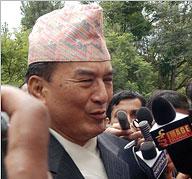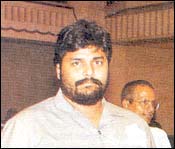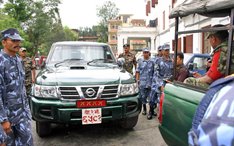Mixed reaction over interim draft constitution
Senior leaders of the ruling seven-party alliance have expressed their dissatisfaction over the "incomplete" draft of the interim constitution, which was submitted to the government and the Maoist talks team on Friday.
Talking to Kantipur Television, UML's Standing Committee member Bharat Mohan Adhikari said that he was dissatisfied by the draft of the interim statute made public yesterday by sidestepping the key political issues.
"We should have made a collective effort to give the interim constitution a complete shape but we failed to do so in time," said Adhikari.
The interim constitution drafting committee on Friday handed over the draft statue to the government and Maoist negotiating teams proposing a referendum to decide the fate of monarchy.
Nepali Congress leader Chakra Prasad Bastola said, "The seven-party alliance leaders could have reached a consensus on the major political issues including the position of the king, interim legislator, among others, before making the interim constitution public," said.
Meanwhile, the Maoists said that the government reluctance to enter into the chief political agenda is the main reason of delay in reaching agreement between the seven-party alliance and the Maoists.
"The interim statute couldn’t be given a complete shape after the leaders failed to reach an agreement at the political level," Krishna Bahadur Mahara, the Maoist spokesman said.
The SPA leaders have said the draft would be presented before a meeting of senior leaders of the seven-party alliance and Maoists soon to arrive at consensus on contentious issues.
The Interim Constitution Drafting Committee has recommended that the fate of monarchy should be decided by a referendum, which should be held along with constituent assembly election.
The draft statute says the interim legislature's chairman will take charge as Head of the State in case monarchy is abolished before the constituent assembly makes any alternative arrangement.
According to the draft, sovereignty and state power will vest in Nepali people. Similarly, the committee has suggested that Nepal will be a democratic and secular state. The draft statue has suggested four options to the political parties on the type of Nepali state - regional federal republic, federal democratic, socialist heading toward republic and heading toward republic.
Serious difference over the issue of monarchy resulted in submission of an incomplete draft of interim constitution, members of the now defunct Interim Constitution Drafting Committee (ICDC) said .
President of the Nepal Bar Association and one of the ICDC members, Shambhu Thapa, said the panel could not make a complete draft of the interim statute because of two schools of thoughts regarding the monarchy and other issues.
The draft of the interim constitution, however, would provide opportunity to the people to choose one of the two schools of thoughts, he said.
Thapa said the ICDC agreed to refer the draft to the top leaders of the seven-party alliance and the Maoists through the government and the Maoist talks teams after they failed to reach consensus on the monarchy, process of interim legislature and constituent assembly polls.
“This is not a complete draft of the interim constitution, but a report which we handed over to the Government-Maoist talks teams,” he said at a programmes held here.
Thapa also warned that the election to constituent assembly would not be held so soon as there would emerge more complications among the political parties once the nation enters the “tunnel” of the constituent assembly.
The duration of the interim statute has been proposed for two-and-half-years and the country would land into further crisis if the constituent assembly election was not held within the period, Thapa said.
He also warned that the constitution made through constituent assembly would also fail like in East Timor and Iraq if the process of the constituent assembly was not handled properly.
Former NBA president and member of the defunct ICDC, Harihar Dahal, said the 16 members of the panel could not reach a consensus due to narrow-mindedness. “Maybe, because of political misunderstanding we could not prepare a draft of consensus,” Dahal said, adding that no principle of constitutionalism was followed while preparing the draft.
He said they kept the monarchy under “transitional provision” and gave no power to the King as per the spirit of the May 18 Declaration of the House of Representatives.
He said that they also could not reach consensus on the process of reappointment of judges, the process of the constituent assembly, number and nature of the interim legislature and issue of citizenship certificates.
“We have given more than one option and kept some issues in brackets where we failed to agree on them,” said Dahal.
Chandeswor Shrestha who represented the Janamorcha Nepal in ICDC said they had extensively discussed whether or not to keep the monarchy in the interim statute.


